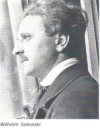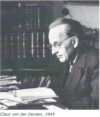Nourishment which Endures (John 6:27)
Do not put your efforts into acquiring the perishable nourishment, but the nourishment which endures and leads to imperishable life. The Son of Man will give it to you. (John 6:27)
If there is anything that binds us to the earth, it is eating and drinking. We have hardly satisfied ourselves, and hunger and thirst are back again. They accompany our earthly life from our first breath to the last, not only in the literal but also in the figurative sense of the word. The thirst for existence is never quenched. Even when we have died, this thirst sooner or later brings us back to the earth, where we still have something to do.
Hunger and thirst also accompanied the life of Jesus Christ on earth. “I thirst”—it was one of the last words on the cross. With this prayer and the bad aftertaste of a bitter beverage He died. But also after His resurrection His hunger and thirst burn for what only we can give Him. Someone once heard Him say: “I am thirsty. I only have what I am given. I take nothing.” [*]
That is also His question to us in the enigmatic, contradictory words from the Gospel of John: “Do not put your efforts into acquiring the perishable nourishment, but the nourishment which endures and leads to imperishable life. The Son of Man will give it to you.” How can Christ ask us for something He Himself gives us?
In the language of the altar this gift, which He gives and asks at the same time, is called the communion. It is much more than a gift. It is also His entreaty: “What can you give me? Can you give yourself to me, now that I have given myself to you?”
Only if I give myself to Him is the meal He wants to share with us perfect. Only then is His thirst for our existence quenched.
–Rev. Bastiaan Baan, March 19, 2023
[*] Gabrielle Bossis, Jesus Speaking: Heart to Heart with the King, Pauline Books and Media.

 Four days after his ordination on September 16, 1922, and still during the founding events in Dornach, Wilhelm Salewski reached the age of thirty-three. He thus belonged to the middle-aged founders between the few older ones and the many very young ones. His birthday on September 20 fell on the ninth anniversary of the laying of the foundation stone for the first Goetheanum building.
Four days after his ordination on September 16, 1922, and still during the founding events in Dornach, Wilhelm Salewski reached the age of thirty-three. He thus belonged to the middle-aged founders between the few older ones and the many very young ones. His birthday on September 20 fell on the ninth anniversary of the laying of the foundation stone for the first Goetheanum building. The midwife had to navigate the flooded Elbe meadows to get to Claus von der Decken’s birth on October 5, 1888, at Preeten Castle near Neuhaus. Claus was the second of four children who were joined by a foster sister. His father, Ernst, from the old Hanoverian landed gentry, was the administrator of various estates. His mother, Anna, was born von Arnswald, whose three sisters were abbesses of the noble convents of Bassum, Medingen, and Ebstorf. Anyone who was brought into a noble convent had to have sixteen full noble great-great-grandparents.
The midwife had to navigate the flooded Elbe meadows to get to Claus von der Decken’s birth on October 5, 1888, at Preeten Castle near Neuhaus. Claus was the second of four children who were joined by a foster sister. His father, Ernst, from the old Hanoverian landed gentry, was the administrator of various estates. His mother, Anna, was born von Arnswald, whose three sisters were abbesses of the noble convents of Bassum, Medingen, and Ebstorf. Anyone who was brought into a noble convent had to have sixteen full noble great-great-grandparents. On the Eschenhof, the family had to endure difficult destinies, both humanly and in terms of health. Cécile von der Decken died in 1928, two years after the birth of her seventh child. Four years of family separation followed. The three older children moved with the Schmidt family to Kassel-Wilhelmshöhe to attend the Waldorf School. The three younger children stayed in Lübeck with their father and were looked after by his mother and sister.
On the Eschenhof, the family had to endure difficult destinies, both humanly and in terms of health. Cécile von der Decken died in 1928, two years after the birth of her seventh child. Four years of family separation followed. The three older children moved with the Schmidt family to Kassel-Wilhelmshöhe to attend the Waldorf School. The three younger children stayed in Lübeck with their father and were looked after by his mother and sister.

 In addition to his work as a classroom teacher, he was soon appointed as a teacher of independent Christian religious education with the task of holding Sunday services as well. His religious groups had over sixty children! During the same period, people repeatedly turned to him – or were sent to him by Rudolf Steiner –requesting baptisms or marriages.
In addition to his work as a classroom teacher, he was soon appointed as a teacher of independent Christian religious education with the task of holding Sunday services as well. His religious groups had over sixty children! During the same period, people repeatedly turned to him – or were sent to him by Rudolf Steiner –requesting baptisms or marriages.